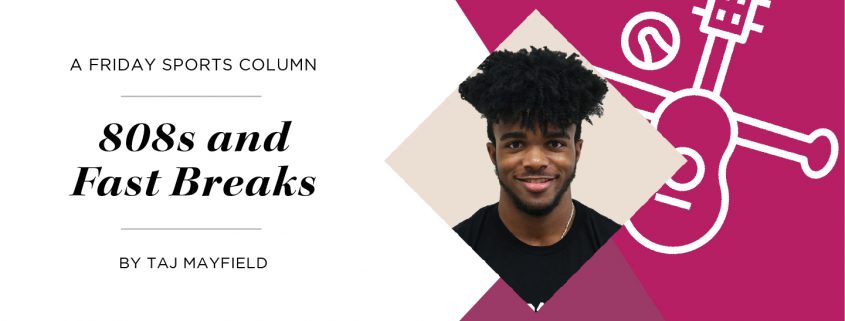808s & Fast Breaks: NCAA is run much like a label company
California Gov. Gavin Newsom signed legislation Monday that will allow California college athletes to be paid for the use of their name, image and likeness.
As someone who has been playing “NCAA Basketball 10” for nearly a decade and “NCAA Football 14” for half that — games which garner revenue from their portrayals of college athletes — this news really hit close to home.
California’s Fair Pay to Play Act will go into effect Jan. 1, 2023, providing ample time for other states and the NCAA to respond. Other states may attempt to follow California, the NCAA will continue to attempt to hide behind the rhetoric of amateurism and, once the rhetoric no longer works, the organization will find a way to get its cut of athlete compensation.
In fact, all three of these actions are already in motion.
Florida state rep. Kionne McGhee wasted no time filing a similar collegiate athlete compensation bill, and a New York senator proposed a bill that calls for the direct payment of college athletes through their universities.
The NCAA, like the billion dollar corporation it is, responded exactly as most would expect, calling the payment of college athletes detrimental to amateurism and stating that “We will consider next steps in California while our members move forward with ongoing efforts to make adjustments to NCAA name, image and likeness rules that are both realistic in modern society and tied to higher education.”
Albeit professional, that statement should strike fear in California colleges and student-athletes across the nation.
For those not versed in reading through media statements, first of all, enjoy that innocence. Secondly, allow me to return to the actual purpose of this column and point out a parallel between the student-athlete compensation situation and music.
When Tekashi 6ix9ine’s former manager Kifano “Shotti” Jordan was on the stand facing several felony charges with a stack of evidence the size of a Chip Kelly playbook working against him, his response was to shout “We don’t bend, we don’t fold, we don’t break,” while backing the gang that led to his arrest and simultaneously threatening his adversaries.
The only difference between Shotti’s response to his future imprisonment and the NCAA’s response to the Fair Pay to Play Act was their target audience. The NCAA essentially threatened punishment to California colleges and told everyone else that it plans to adapt rather than bend, fold or break.
But what will adaptation look like for a power-hungry organization whose main resource — its athletes — will soon take a slice of its once-monopolized pie?
The answer is to eat off the plates of the athletes that the organization has made a living off starving. It’s a method already widely practiced in, you guessed it, the music industry.
When the multi-billion dollar music industry experienced a decline in record sales, labels found a new way to maximize their artists’ profit capability. Rather than taking a percentage strictly from the amount of records an artist sells, labels began to take from artists’ earnings from tour tickets, movie deals and even local pop-up shops.
This type of deal is technically listed as a “multiple rights deal,” but is commonly referred to as a 360 deal since the label takes artist money from literally every sector.
Being a proud journalism major, I understand the importance of objectivity in media, so I will present both sides of the 360 deal.
From the artist’s perspective, they are being robbed. Due to their label’s inability to sell records, they have to give up checks from other avenues like movie contracts and tour tickets. From the label’s perspective, they are stealing from the artist. In response to not being able to make as much money as they would like from an artist’s music, they decide to find other ways to take as much money from the artist as they can.
I’ll admit that wasn’t very objective.
The actual stance of labels is that they are entitled to a percentage of every deal the artist makes because they contribute to the artist’s success by leveraging media networks and exclusive feature and tour placements.
These were all things that labels provided in the past without taking percentages because record sales were high, but when sales declined, the industry had to adapt.
It’s easy to picture a situation in which the NCAA makes the same argument as the music industry: It is entitled to student-athletes’ endorsement dollars because it provides the stage for performance.
The Fair Pay to Play Act is a step in the right direction, but by no means is the battle for college athlete compensation over. Much like the music industry did years prior, the NCAA will find a new way to make sure the hard work and talent of players feed those at the top first.
Taj Mayfield is a sophomore writing about connections between music and sports. His column, “808s & Fast Breaks,” runs every other Friday.

